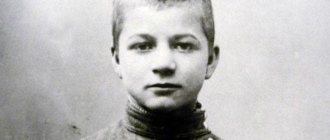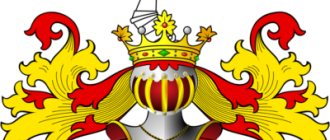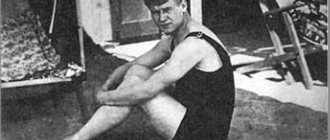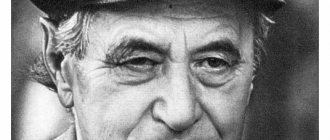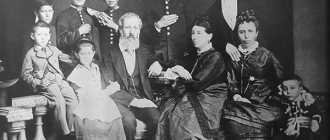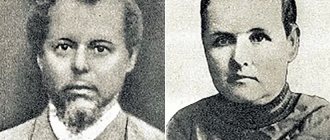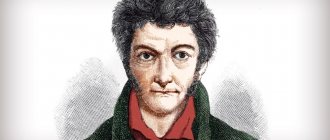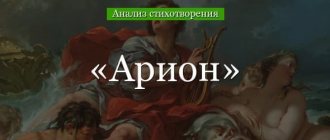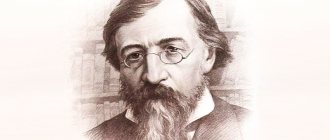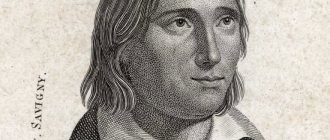June 6, 1799 – February 10, 1837 (37 years)
4.4
Average rating: 4.4
Total ratings received: 25571.
Alexander Sergeevich Pushkin (1799-1837) - great Russian poet, prose writer, playwright. The author of immortal works in verse and prose: the novels “Eugene Onegin”, “Dubrovsky”, the famous poems “Ruslan and Lyudmila”, “Prisoner of the Caucasus”, the story “The Queen of Spades” and many others, as well as fairy tales for children.
The material was prepared jointly with a teacher of the highest category, Kuchmina Nadezhda Vladimirovna.
Experience as a teacher of Russian language and literature - 27 years.
early years
Alexander Sergeevich Pushkin was born on June 6 (May 26, old style) 1799 in Moscow into a family of an untitled noble family. The poet’s great-grandfather on his mother’s side was the African Abram Petrovich Hannibal, who was a pupil and servant of Tsar Peter I.
In addition to Alexander Sergeevich, the family had two more children - son Lev and daughter Olga. From 1805 to 1810, Pushkin spent a lot of time (especially in the summer) with his grandmother in the village of Zakharovo near Moscow. It was the grandmother who hired Arina Rodionovna Yakovleva, the nanny whom young Pushkin loved so much.
Childhood
Pushkin was born on May 26 (June 6), 1799 in Moscow into a poor noble family. In his childhood, Pushkin was greatly influenced by his uncle, Vasily Lvovich Pushkin, who knew several languages, was familiar with poets, and was himself no stranger to literary pursuits. Little Alexander was raised by French tutors, he learned to read early and already in childhood began to write poetry, albeit in French. Summer months 1805-1810 the future poet usually spent time with his maternal grandmother, Maria Alekseevna Gannibal, in the village of Zakharovo near Moscow, near Zvenigorod. Early childhood impressions were reflected in Pushkin’s first works: the poems “The Monk”, 1813; "Bova", 1814; and in the Lyceum poems “Message to Yudin”, 1815, “Dream”, 1816.
Education and the beginning of a creative path
In 1811, Pushkin studied at the Tsarskoye Selo Lyceum. In the biography of Pushkin, it is important to highlight that his poems first appeared in print in 1814, in the journal “Bulletin of Europe”, where his poem “To a Poet Friend” was published. During the same period, the poet was accepted into the Arzamas literary society.
Voltaire and Evariste Guys were the favorite authors of the young Pushkin.
The further work of the young Pushkin was greatly influenced by the works of such classics of Russian literature as Batyushkov, Zhukovsky, Fonvizin and Radishchev.
Brief Biography of Pushkin (The Most Important Thing)
Biography of Pushkin: the most important things are briefly summarized in this essay by a junior school student. The schoolboy tried to describe the biography of the poet he liked. You can see how well he did it below.
I enjoy reading Pushkin's fairy tales. I liked the work of this author so much that I wanted to know about what he was like and how he lived. It is precisely the facts from the biography of Alexander Sergeevich that I want to share with you.
This wonderful poet was born in 1799. He spent his childhood in Moscow. Alexander Sergeevich's father was a retired major. Pushkin grew up in an educated family. Musicians, poets and artists often came to visit their parents. The pride of the Pushkins was their huge library. All this shaped the mind and soul of the future poet.
The boy studied at the Tsarskoye Selo Lyceum, which was located near St. Petersburg. There he was called “French”, because it was in this language that Pushkin composed his first poems. It was published for the first time in 1814.
After completing his studies, the graduate goes to St. Petersburg to work at the College of Foreign Affairs with the rank of secretary. In his free time, he goes to theaters, attends balls, and meets with poets and writers. Alexander Sergeevich’s first major work is the poem “Ruslan and Lyudmila”.
Tsar Alexander I sent him into southern exile for the poems that Pushkin wrote. There Alexander Sergeevich writes poems. Working on the novel “Eugene Onegin”. After the death of Alexander I, Tsar Nicholas I allows Pushkin to live where he wants. But he personally checks the works written by the poet. At this time, Alexander Sergeevich lives either in Moscow or in St. Petersburg.
In 1829, Pushkin chooses Natalya Goncharova, who is almost two times younger, as his wife. Before his marriage, the poet lives on the Boldino estate. There he works on works of various genres. This time is known as Boldino autumn. In 1831 they got married. After the wedding, Alexander Sergeevich and his wife live in St. Petersburg.
The poet died in 1837. 2 days before his death, he had a duel with Dantes over Natalya Goncharova. Dantes mortally wounded Pushkin in the stomach.
This is the difficult, but at the same time interesting and creative fate of Alexander Sergeevich. Many years have passed since his death, but children and adults still read his fascinating works. Unfortunately, now there are almost no such masters of their craft.
Brief Biography of Pushkin (The Most Important Thing)
4.2 (84.3%) 2639 votes
Searched on this page:
- biography of Pushkin 4th grade
- message about Pushkin grade 4
- biography of Pushkin for 4th grade
- essay about Pushkin for 4th grade
- message about Pushkin 4th grade summary
Save it to your wall!
The poet's work
In 1819, Pushkin was accepted as a member of the Green Lamp literary and theatrical community. During the same period, he was actively working on the poem “Ruslan and Lyudmila” (1820).
In 1821, Pushkin wrote the poem “Prisoner of the Caucasus,” which makes him one of the greatest writers among his contemporaries. A year later, work begins on “Eugene Onegin” (1823-1832).
In 1832, the poet decided to create a historical novel about the times of the Pugachev era, for which he studied all available materials (many of them were classified at that time), and traveled to many places where the uprising took place. After all these travels, in the fall of 1833, he wrote “The History of Pugachev” and “Songs of the Western Slavs,” as well as the poems “Angelo” and “The Bronze Horseman,” and began work on the story “The Queen of Spades.”
At the same time, Pushkin begins work on the novel “Dubrovsky,” in which the main character has to become a robber.
Links
Political lyrics of Pushkin 1817-1820. (“Liberty”, “To Chaadaev”, “Village”) aroused the wrath of Alexander I, and Alexander Sergeevich could have been exiled to Siberia. Only thanks to the efforts and influence of Karamzin, Zhukovsky and Krylov, exile to Siberia was avoided. So, in May 1820, Pushkin was exiled to the south of Russia under the guise of a official transfer.
During his southern exile, Pushkin became very interested in Byron's work.
In one of his letters, Pushkin spoke ironically about religion. The letter was intercepted and delivered to Alexander I. The result was Pushkin’s dismissal from service and his second exile, to the village of Mikhailovskoye (1824-1826).
last years of life
It is important to note this point in Pushkin’s biography: after being promoted to the rank of chamber cadet, Alexander Pushkin decides to leave the service and resigns. The poet’s position looks completely disastrous, since many of Pushkin’s works are not allowed to be published due to censorship (for example, the poem “The Bronze Horseman”).
In 1834, Pushkin completed the story “The Queen of Spades,” which he immediately sent to the journal “Library for Reading.” He receives a high fee for the story, but he still fails to resolve financial issues.
In 1836, Alexander Sergeevich Pushkin decides to publish the Sovremennik magazine. However, the magazine is not popular with the public. The historical novel “The Captain's Daughter” was published for the first time in the fourth volume of this magazine.
In 1837, a conflict arose between Alexander Sergeevich Pushkin and Georges Dantes. Pushkin challenges Dantes to a duel, and as a result receives a mortal wound in the stomach.
Emperor Nicholas I, knowing about the poet’s difficult condition, promises to provide income for his family and pay off all debts. Subsequently, the monarch fulfilled all promises. The poet died on January 29 (February 10), 1837.
Pushkin's creativity
The works of the greatest Russian poet Alexander Sergeevich Pushkin contain all literary forms of prose and poetry, dramatic works and fairy tales, poems and poems, sonnets and elegies, odes and epistles, madrigals and epigrams, even a novel and a story in verse. He also wrote a lot on literary topics - critical articles, reviews, journalistic, historical studies. His literary and cultural heritage is summarized through his diaries, letters and autobiographical notes.
Pushkin was an innovator in every genre in which he wrote, he broke outdated canons, introduced new forms and a new style. He rebelled against classicism in literature, wanted to return to tragedy its spontaneity, simplicity, truthfulness, characteristic of everyone, vital and human versatility in the formation of characters.
A true depiction of a time, an era, the development of historical characters and events - these are all the requirements of realistic art, an expression of the deeply thought-out and hard-fought historicism of Pushkin the citizen, Pushkin the psychologist, his philosophy of history, which was developed in close connection with the prevailing intellectual ideas of that time. views, revelations of the era. Historically, these socio-political views were reflected in the Decembrist uprising, and in the poet’s work - in the tragedy “Boris Godunov”.
Having transformed the Russian poetic language and made a revolution in dramatic literature, Pushkin turned to the development of artistic prose; he believed that Russian prose was significantly behind poetry. I thought that the language of prose writers was too windy and tortuous. A real innovation in this area was Belkin’s Stories, in connection with the style of which he once said that stories should be written exactly like this: simply, briefly and clearly.
The most fruitful year in the creative life of the great poet was 1830, the so-called Boldino Autumn of Pushkin, during which he wrote about 50 works, including finishing the novel in verse “Eugene Onegin”, wrote “Little Tragedies” - these are some of the most famous his works. The laconicism characteristic of the works of this period of Pushkin’s work is amazing even for him: this laconicism, concentration of thoughts, inexhaustibility of ideas with extreme simplicity and clarity of narrative forms.
Each of the “little tragedies” is an artistic exploration of the depths of human essence, morals, psychology: acquisitiveness and envy, adultery, attitude towards life and death. At the same time, each covers a certain historical era, the interesting, versatile characters generated by it, the fullness and contradictory behavior of the heroes. Pushkin’s works are closely connected with folklore; he often used images and plots of folk art; his fairy tales reflect not only stories, but also genre and stylistic features of folklore.
Yes, the works of the genius of literature and thought are immortal, immortal in the truthfulness of the development of the characters’ characters, in the skill of depicting the time in which they lived, which makes the stories told by a great writer transcend time and space.
Interesting Facts
- It is interesting that the future classic of Russian literature remembered himself from the age of four. Remembering this time, Pushkin said that while on a walk, he felt the vibrations of the earth. Just at this time the last earthquake occurred in Moscow.
- Then, in early childhood, Pushkin’s first brief meeting with Alexander I took place. While walking with his nanny, little Sasha almost fell under the hooves of the emperor’s horse. The tragedy was avoided - Alexander held his horse.
- Alexander Sergeevich Pushkin loved books so much that he collected more than 3,500 copies in his home library.
- He was also a polyglot: he knew many foreign languages, including French, Greek, Latin, German and some others.
- In addition to creativity, Pushkin had two more great hobbies in his life - women and gambling. Possessing a special charm and charm, he attracted females. The poet's first love happened at the age of 16. From then until the end of his life, Pushkin had special feelings for women.
- He was also an avid gambler. Because of this, the poet often got into debt. However, it was his love for cards and the need for money that spurred Pushkin to write works, with fees for which he sometimes paid off his debts.
- Pushkin by nature was a sarcastic person. His jokes and mockery of his friends and contemporaries often led to duels.
- The poet participated in two dozen duels. In most fights, Alexander Sergeevich’s friends managed to reconcile the duelists. The first duel took place when Pushkin was still a lyceum student. The last, 29th duel, turned out to be fatal for him.
All interesting facts from the life of Pushkin
Biography (option 1)
1. Childhood and Lyceum (1799 - 1817)
|
Alexander Sergeevich Pushkin was born on June 6 (May 26, old style) 1799 in Moscow. His father, Sergei Lvovich (1771 -1848), came from a landowner, once rich family. From the estates of his ancestors (in the Nizhny Novgorod province) little reached him; but he even squandered what he had received, not at all interested in economic matters; He served in the Moscow Commissariat, but was not concerned about the service. Among his acquaintances there were many writers, and his brother Vasily Lvovich gained fame as a poet.
In Pushkin's house they were interested in literature, and Sergei Lvovich himself was a fan of French classics and himself wrote French and Russian poetry, which, however, was known only to friends and relatives. Pushkin's mother, Nadezhda Osipovna, née Hannibal, was descended from Hannibal, Peter's "blackamoor" depicted in Pushkin's novel.
Pushkin's upbringing was careless. The changing French tutors and random teachers could not have a deep influence on the child, who was largely left to his own devices. Pushkin spent his childhood in Moscow, going for the summer to Zakharovo County, to his grandmother’s estate near Moscow.
In addition to Alexander, the Pushkins had children - the eldest daughter Olga and the youngest son Lev. Parents did not pay much attention to their children, and, apparently, Alexander was not the favorite child in the family.
His brother later wrote about Alexander’s childhood: “Until the age of eleven, he was brought up in his parents’ home. A passion for poetry appeared in him with the first concepts: at the age of eight, already able to read and write, he composed small comedies and epigrams in French for his teachers. In general, his upbringing contained little Russian. He heard only French; The tutor was a Frenchman, but not a stupid and educated man; his father's library consisted of only French works. The child spent sleepless nights and secretly devoured books one after another in his father’s office.”
In 1810, a project arose for the establishment of a privileged educational institution - a lyceum in Tsarskoye Selo, at the palace of Alexander I. Pushkin, who had influential contacts, decided to send his son Alexander there. In June 1811, Alexander and his uncle went to St. Petersburg, thanks to existing connections, Pushkin was guaranteed admission. On August 12, he passed the entrance exam. On October 19, the Lyceum was solemnly opened and from that day Pushkin’s lyceum life began.
|
The Lyceum was a closed educational institution; only 30 students were admitted to it. These were the children of average, low-income nobles with official connections.
In connection with the political events of 1812, the capture of Moscow by the French endangered St. Petersburg. Due to the large flow of soldiers passing through Tsarskoye Selo, a liberal spirit reigned in the lyceum. Gossip about Alexander I and his entourage penetrated into the lyceum.
Pushkin’s horizons at that time were expanded by P. Chaadaev, who found himself in a hussar regiment in Tsarskoe Selo. Chaadaev was very liberal-minded; he had long political conversations with Pushkin and played a significant role in Alexander’s moral concepts. Subsequently, Pushkin dedicated one of his first political poems to Chaadaev.
Of the Russian poets, Pushkin was attracted by Batyushkov and the entire group of writers united around Karamzin. Pushkin was connected with this group through family relationships, in particular through his uncle, who was a member of it.
In Karamzin’s house, which was located in Tsarskoye Selo, Alexander met Zhukovsky and Vyazemsky, their influence was especially reflected in Pushkin’s work starting in 1815. Pushkin’s favorite poet was Voltaire; it was to him that Pushkin owed both his early atheism and his penchant for satire, which, however, was also dependent on the literary struggle of the Karamzinists and on the playful satires of Batyushkov.
The Pushkin Lyceum also touched upon new trends in poetry of that time: “Ossianism” and “Bards”. Towards the end of his stay at the Lyceum, Pushkin was strongly influenced by the new elegiac poetry associated with the activities of such French poets as Guys and Millvois. Pushkin’s literary lyceum fame came to him at the age of 15, when he first appeared in print, publishing the poem “To a Poet Friend” in the July issue of Vestnik Evropy.
In October 1815, the literary society "Arzamas" was formed and it existed until the end of 1817. In addition to Arzamas and Beseda, there were also literary societies. One of them was a circle of writers who gathered at Olenin’s. Opponents of “Conversation” gathered there, but not supporters of “Arzamas” either. The leaders of this circle were the fabulist Krylov and Gredich.
all the likes and dislikes of Arzamas.
His tenure at the Lyceum ended in the summer of 1817. On June 9, final exams took place, at which Pushkin read the ordered poem “Unbelief.” Arzamas resident F. Wigel wrote in his memoirs: “The members of Arzamas looked at the graduation of young Pushkin as a happy incident for them, as a triumph. His parents themselves could not have taken a more tender part in him; especially Zhukovsky, his successor in Arzamas, seemed happy, as if God himself had sent him a sweet child. The child seemed quite playful and unbridled, and it even hurt me to watch how all the older brothers spoiled their little brother during the break. They will ask: was he a liberal then? How could it not be for an eighteen-year-old boy who had just broken free, with an ardent poetic imagination, boiling African blood in his veins, and in an era when free-thinking was in full swing.”
| 1. Childhood and Lyceum (1799 - 1817) 2. Petersburg (1817 - 1820) 3. In the South (1820 - 1824) 4. Mikhailovskoye (1824 - 1826) 5. The end of the twenties 6. Boldino autumn, 1830 7. The thirties 8. The universality of Pushkin |
Forward
